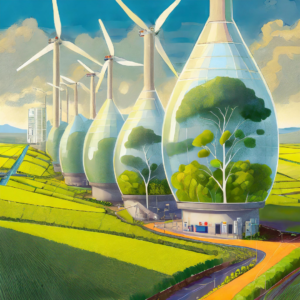Sustainable agriculture practices play a vital role in preserving our planet’s health and securing our future. In this blog, we will explore the importance of sustainable agriculture, its benefits, and practical tips for implementing these practices on your farm. Let’s dive in!
Why Sustainable Agriculture?
Sustainable agriculture goes beyond conventional farming methods to prioritize long-term ecological balance, increased biodiversity, and the protection of natural resources. By adopting sustainable practices, we can mitigate the negative impact of agriculture on the environment and promote a healthier and more resilient ecosystem.
Benefits of Sustainable Agriculture

Environmental Conservation:
Sustainable agriculture minimizes soil erosion, reduces water consumption, and lowers greenhouse gas emissions. By preserving the delicate balance of nature, we ensure the availability of resources for future generations.Economic Stability:
By transitioning to sustainable agriculture practices, farmers can achieve long-term economic stability. Reduced input costs, improved soil quality, and diversified income streams lead to enhanced profitability and resilience in the face of changing market conditions.Enhanced Biodiversity:
Sustainable agriculture aims to restore and maintain biodiversity by avoiding the use of harmful synthetic pesticides and promoting natural pest control methods. This, in turn, fosters a healthier ecosystem where plants, animals, and beneficial insects thrive.
Key Sustainable Agriculture Practices
- Crop Rotation
Crop rotation involves systematically rotating crops in different fields each growing season. This practice improves soil fertility, reduces the risk of disease and pests, and helps break weed cycles naturally. Rotating nitrogen-fixing legumes with other crops can also replenish soil nutrients. - Organic Pest Control
Instead of relying on chemical pesticides, sustainable agriculture practices encourage the use of natural pest control methods. This includes introducing beneficial insects, implementing crop diversification, and utilizing biological pest control agents like neem oil or Bacillus thuringiensis. - Water Conservation
Efficient water management is vital in sustainable agriculture. Techniques such as drip irrigation, mulching, and rainwater harvesting minimize water waste and ensure that crops receive adequate moisture without straining local water resources. - Soil Health Management
Nurturing soil health is crucial for sustainable agriculture. Practices like composting, cover cropping, and reduced tillage help improve soil structure, increase organic matter content, and enhance nutrient availability. Healthy soils result in more productive crops and reduced reliance on synthetic fertilizers. - Agroforestry
Agroforestry combines trees or shrubs with agricultural crops, enhancing biodiversity, providing shade, preventing soil erosion, and improving microclimates. This practice not only promotes sustainable farming but also generates additional income through timber, fruits, or nuts.
Transitioning to Sustainable Agriculture: Tips and Considerations
Start Small and Prioritize:
Begin by implementing sustainable practices on a small scale, focusing on areas that align with your farm’s specific needs and goals. Gradually expand and refine your practices as you gain experience.
Educate Yourself:
Stay up-to-date with the latest research, strategies, and best practices in sustainable agriculture. Attend workshops, seminars, and connect with other farmers who have successfully implemented sustainable practices.
Partner with Experts:
Seek guidance from agricultural extension services, local farming organizations, or sustainable agriculture experts. They can provide valuable insights, technical assistance, and even financial incentives for adopting sustainable practices.

Monitor and Adapt:
Regularly assess the impact of your sustainable agriculture practices. Monitor soil quality, crop yields, and resource consumption. Make adjustments as needed to optimize your farm’s sustainability and productivity.
Sustainable agriculture practices are not only crucial for our planet’s health but also essential for the long-term viability of farming. By implementing crop rotation, organic pest control, water conservation, soil health management, and agroforestry, farmers can reduce environmental impact, increase economic stability, and foster biodiversity. Embrace sustainable agriculture today and be a steward of our planet’s future!
Remember, when it comes to sustainable agriculture, every small step counts. Let’s nurture the Earth together for future generations.
Read more about Embracing the Zero-Waste Lifestyle: A Path to Sustainable Living – Click Here
Read more about Sustainable Living Tips: Nurturing the Planet for Future Generations – Click Here




